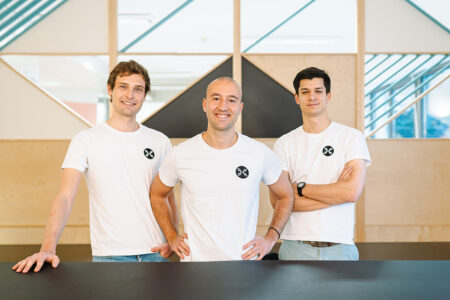Artificial intelligence is expected to have a huge impact on healthcare. One example is the recent development of “foundation models” – AI models trained on massive amounts of data that can perform a wide variety of tasks – which has the potential to radically transform biomedical research and drug discovery.
 This new opportunity caught the attention of Maxime Allard, Mathieu Klop and Rick Schneider, three Luxembourgish childhood friends with a shared passion for deep learning and medicine. “These large models – which can be as large as the one powering ChatGPT – can be applied to biological data to significantly speed up drug discovery. However, we found out that even though many companies are very interested in using them, they often have questions about where to start and how to include the models in their daily research and development activities,” recalls Mr Allard.
This new opportunity caught the attention of Maxime Allard, Mathieu Klop and Rick Schneider, three Luxembourgish childhood friends with a shared passion for deep learning and medicine. “These large models – which can be as large as the one powering ChatGPT – can be applied to biological data to significantly speed up drug discovery. However, we found out that even though many companies are very interested in using them, they often have questions about where to start and how to include the models in their daily research and development activities,” recalls Mr Allard.
Our platform will provide businesses with state-of-the-art AI models and make it possible to leverage them in their advanced research workflows.
To overcome these hurdles, the three friends founded Helical and launched the development of a platform empowering pharmaceutical companies to leverage the most powerful bio foundation models in their drug discovery process. “Our platform will provide businesses with state-of-the-art AI models and make it possible to leverage them in their advanced research workflows,” says Mr Allard. “It will also help the users define how to apply the models for specific use cases that are part of the drug development process.”
Top-performing mRNA foundation model
Helical has recently released its own large bio foundation model for mRNA sequences – the main technology used to create certain COVID-19 vaccines. To pretrain the model on biological data, the company collaborated with LuxProvide, the manager of Luxembourg’s business-oriented supercomputer MeluXina. Mr Allard requested to join the Initiate programme offering startups the opportunity to experiment with MeluXina’s computing power and storage and benefit from LuxProvide’s expertise. “The process was very smooth, and I got immediate access to the computing power needed to run the model,” he says.
Analyses show that Helical’s mRNA model equals or outperforms those developed by major pharma companies such as Sanofi or Johnson & Johnson. “It is very satisfying to see that we are able to build AI in Luxembourg that can compete with that of large international companies,” Mr Allard emphasises. Helical plans to continue the collaboration with MeluXina, which also has the unique feature of being hosted in a Tier IV datacentre that guarantees exceptionally high standards of security. “Data is the most valuable asset of our clients. They can use our platform in their own data environments, but those who prefer benefitting from MeluXina’s computing power will enjoy top-tier data security.”
Global expansion, local roots
In 2024, Helical launched its first large project together with a leading US pharma company, and several more are in the pipeline. The company is also building an open-source community for AI-driven biotech innovations. “I hope that the open-source part of our platform will result in a lot of academic connections,” says Mr Allard who is already in contact with the University of Luxembourg and Imperial College in London.
Luxembourg is a central location, which also allows us to easily connect with key stakeholders across the ecosystem who help us move forward.
The startup is hosted at the Luxembourg City Incubator, with part of its team working in London. “Luxembourg is a central location, which also allows us to easily connect with key stakeholders across the ecosystem who help us move forward. To source talents, we are looking at several leading AI hubs around the world. Team members coming from academic institutes such as Cambridge University, Imperial College and world-leading tech companies bring invaluable expertise, a significant asset for a startup.”
The team has secured business angel investment from the co-founders of world-leading AI companies Cohere and Huggingface. To further expand its network and benefit from additional mentorship, the company has successfully applied for participation in Luxembourg’s leading accelerator programme Fit 4 Start. “I hope that through Fit 4 Start and collaboration with Luxembourg’s newly established AI Factory initiative, we will be able to develop the biotech AI niche here,” says Mr Allard. “We want to expand globally but be rooted locally. Strengthen the Luxembourg community is one of our goals.”
Photo credits: © Léna Le Roy / Silicon Luxembourg
